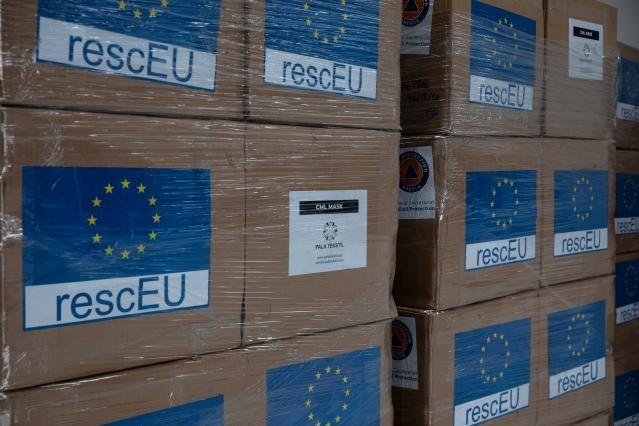EU Civil Protection Mechanism
During the COVID-19 pandemic, the EU coordinated and financed the delivery of medical equipment and related items, and co-financed repatriation flights for almost 100 000 EU citizens through the EU Civil Protection Mechanism.
Protective equipment items, such as facemasks, gowns, gloves, goggles, overalls, disinfectant, and other products were delivered across Europe and the world, to countries that have sought assistance.
Overall, during the COVID-19 pandemic, the EU:
-
coordinated and co-financed deliveries of over 190 million medical and personal protective equipment items
-
reinforced hospitals with additional medical staff
-
provided over 10.5 million vaccine doses to over 55 countries in Europe and worldwide via the EU Civil Protection Mechanism.
The assistance was possible thanks to the EU’s Emergency Response Coordination Centre (ERCC), the emergency hub of the European Union. The ERCC responded to over additional 170 requests for assistance related to COVID-19, not including repatriations.
rescEU – a common reserve of medical equipment

The strategic rescEU medical reserve capacity was created by the Commission in 2021 to respond more quickly to needs caused by health crises such as the COVID-19 pandemic.
The common reserve enabled the swift delivery of over 3 million items of medical and protective equipment and laboratory supplies to Member States facing the pandemic.
The stockpile was hosted in 10 EU countries (Belgium, Croatia, Denmark, Germany, Greece, Hungary, Romania, Slovenia, Sweden, and The Netherlands), and was entirely financed by the Commission.
Team Europe approach – assistance outside the EU
From the outbreak of COVID-19 in early 2020 until the end of 2021, €47.7 billion were disbursed in a Team Europe approach in support of more than 140 partner countries to address the pandemic and its consequences. This support was reported by the Commission under a joint Team Europe monitoring mechanism and combined resources from the Commission, the EU Member States, the European Investment Bank, and the European Bank for Reconstruction and Development.
From the overall €53.7 billion that the Team Europe package mobilised, €47.7 billion were disbursed by December 2021, to respond to emergency humanitarian needs (€3 billion), to strengthen health, water and sanitation systems (€10.6 billion), and to mitigate the socio-economic consequences of the pandemic, including job loss and education (€34.1 billion).
These disbursements relative to commitments were made to:
-
European neighbourhood: €13.6 billion out of €15.6 billion
-
Sub-Saharan Africa: €8.3 billion out of €9 billion
-
Western Balkans and Türkiye: €6.8 billion out of €7.6 billion
-
Asia and the Pacific: €4 billion out of €4.3 billion
-
Latin America and the Caribbean: €2.5 billion out of €3.2 billion
-
Africa, Caribbean and Pacific, regional: €539 million out of €743 million
-
Overseas territories and Greenland: €579 million out of €631 million
-
Global programmes: €8.6 billion out of €9.7 billion
The Organisation for Economic Co-operation and Development (OECD) has been collecting and publishing data on donors’ global response to COVID-19 as part of its annual statistical reporting on development assistance. For figures on Team Europe approach actors’ global response to the pandemic as of 2022, downloadable data will be available for consultation in the OECD’s online database (the Creditor Reporting System (CRS) where you can download the dataset and look at the transactions marked with the COVID keyword (#COVID-19). The respective data for 2022 is expected to be released by OECD in December 2023.
Global vaccination
Pandemics know no borders. Since early on, the EU strove to guarantee equitable access to affordable, safe and effective COVID-19 vaccines for all. The EU organised the Coronavirus Global Response, launched with partners the Access to COVID-19 Tools (ACT) Accelerator, and supported COVAX, a global initiative aimed at equitable access to COVID-19 vaccines.;
The Commission, Member States and the European Investment Bank became a leading investor in COVAX, with over €5 billion to make available 1.8 billion doses of vaccines for 92 low and middle-income countries.
In parallel, the new EU vaccine-sharing mechanism allowed Member States to share EU purchased doses with third countries, including through COVAX.
By August 2023, EU Member States have shared more than 530 million doses for donation to countries around the world. The large majority, around 445 million doses, have been shared via COVAX. In addition, EU Member States have delivered 87 million doses through bilateral donations – for instance to our neighbours in the Western Balkans.
The EU also supported partners with vaccination strategies and the distribution of supplies, with an additional €300 million to accelerate the roll-out and uptake of vaccines in Africa and an additional €100 million to enhance access and deployment of diagnostics, and therapeutics, and strengthen health systems in partner countries.
To boost local manufacturing and access to vaccines in Africa, in May 2021 Team Europe launched a €1 billion initiative in support of the African Union’s goal of manufacturing locally 60% of the vaccines used on the continent by 2040. In partnership with Spain, the EU also launched a partnership with Latin America and the Caribbean to support local manufacturing of vaccines, medicines and other health technologies, and to strengthen the resilience of health systems.
